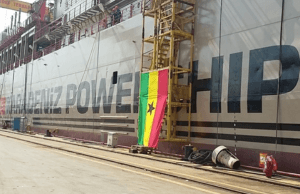South Africa cancels contract of Ghana power producer Karpowership over environmental concerns
 South African authorities have cancelled a contract between the country and Turkish company Karpowership to generate electricity. The country’s Department of Forestry, Fisheries and the Environment says the environmental impact assessment (EIA) presented by the power company doesn’t meet its standards which require that Karpowership have open and transparent engagements on the possible negative impacts of its operations and what the mitigation factors are with all stakeholders who would be affected by its operations.
South African authorities have cancelled a contract between the country and Turkish company Karpowership to generate electricity. The country’s Department of Forestry, Fisheries and the Environment says the environmental impact assessment (EIA) presented by the power company doesn’t meet its standards which require that Karpowership have open and transparent engagements on the possible negative impacts of its operations and what the mitigation factors are with all stakeholders who would be affected by its operations.
The department believes that Karpowership has failed to fulfill the EIA requirements to be given a licence to start operations.
The Environment Department in its rejection letter faulted Triplo4 Sustainable Solutions, the consultants of Karpowership for failing to conduct a proper public participation process or listen to experts who said additional studies were needed to quantify the potentially destructive impact the ships could have on birds, fish and fishing communities.
“The minimum requirements, specifically with regard to public participation, were not met. The purpose of public participation is not only to promote informed decision making, but also to promote the legitimacy and acceptance of an outcome or decision and to promote participatory democracy.
“The actual and potential impacts on the environment as well as socio-economic conditions could not be properly evaluated (particularly insofar as small-scale fisheries are concerned),” the Department said in its rejection letter.
It also cited Triplo4’s failure to “fully investigate” the impact that underwater noise would have on marine life.
Karpowership which has been operating in Ghana for about six years had a smooth sailing process. At the time Ghana signed the contract with the company sometime in June 2014, the country was going through severe power outages, which put pressure on the government to act, and therefore, issues about environmental impact never came to the fore, until when the power barge was docked at the Tema fishing harbour – fishermen and locals raised concerns about the impact of the operations on their health, but they were quickly reassured by Karpowership and some government officials that there wouldn’t be any and that appeared to have satisfied them.
In South Africa, Karpowership won the lion’s share of the bid for the provision of some 2000MW of power to fill the gap as the country is going through difficult times in power supply leading to contraction of the economy, which has come under pressure from the effects of COVID-19.
Karpowership was waiting for the authorization from the Environment Department to dock its three ships at the following three ports: Coega, Saldanha and Richards Bay. But the Department declined, effectively putting the breaks on Karpowership’s plans.
The company however has 20 days to seek a review. According to the SABC, Karpowership says it is reviewing the decision.
The decision if reversed after review will see Karpowership secure a $16-billion deal from South Africa in the next 20 years.
Meanwhile, the operations of Karpowership in Ghana, contrary to its early promise to produce stable and cheap power hasn’t materialized yet almost six years after it started operations – the country still suffers power outages and electricity hasn’t become cheap. It has also heaped on mounting debts on the country because of the terms of the agreement that says Ghana would pay for all the power it generates and even when it produces excess power that the country doesn’t need, would still have to pay for it. It has been estimated that Ghana would have to pay about $12.5 billion for excess power by 2023.
By Emmanuel K. Dogbevi
Copyright ©2021 by NewsBridge Africa
All rights reserved. This article or any portion thereof may not be reproduced or used in any manner whatsoever without the express written permission of the publisher except for the use of brief quotations in reviews.
